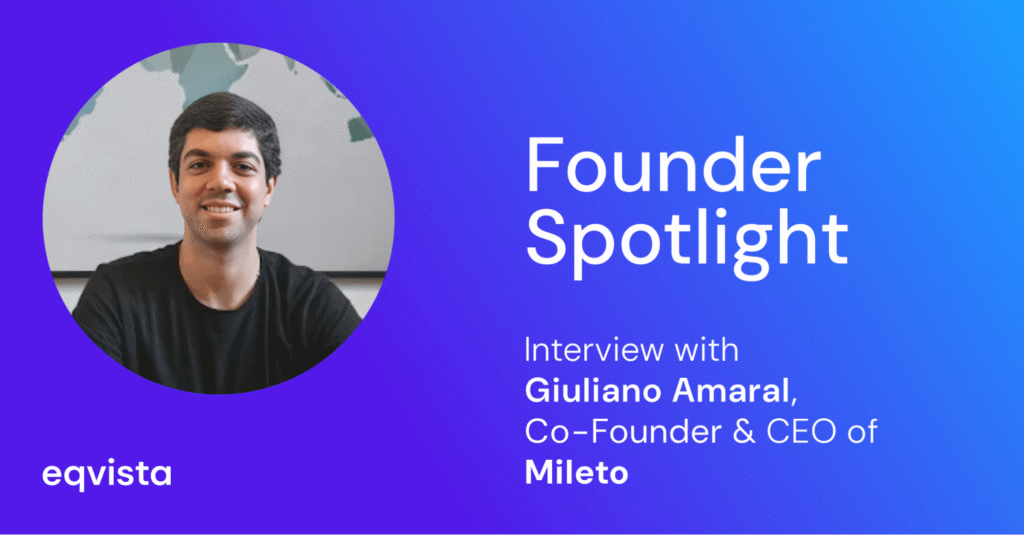Interview With Giuliano Amaral, Co-Founder and CEO of Mileto
In this edition of founder spotlight, we feature Giuliano Amaral, co-founder and CEO of Mileto, a Brazilian HR tech startup. Mileto operates as a B2B platform connecting companies with students from Brazil’s technical high school programs, facilitating tailored internships and supporting the development of both hard and soft skills. Mileto bridges the gap between education and the job market for Generation Z youth, offering a strategic link for companies seeking new talent profiles. Mileto stands out by turning the traditional internship model into a full learning journey, empowering young professionals and creating value for both companies and society as a whole.
Giuliano, with a background in executive leadership within the education sector (including prior roles as CEO of Red Balloon and Marketing Director at Saber Educação), leads the company’s mission to bridge the gap between education and the job market for young professionals.

Giuliano, thank you for joining us. You have a diverse background in education, finance, and business. What inspired you to launch Mileto, and focus on technical high school students?
At 15, I programmed a website about soccer and developed an RPG game by myself. I never published them, but it was a symbolic moment in my life. The pleasure I found in creating both was incomparable to the tedium of high school—three years dedicated to workbooks just to pass a university entrance exam.
Twenty years later, after more than 10 years in strategic roles across various education sectors, I became fascinated with solving the challenge of youth employability. I studied the topic extensively, visited many schools and companies, and spoke with many executives and educational leaders. I’ll never forget the day I visited a technical school and saw 15-year-old students working on an engine solution. The ideal bridge between education and work was right there in front of me: engaged young people, teamwork, a real-world problem being solved with knowledge that had a clear practical use for life. It was then I became convinced that these young people already want to and can contribute significantly to companies, creating a highly efficient opportunity for talent investment and patient career-building, especially since they have many years ahead with a lower cost of living than adults.
Later, I saw in the data that developed countries already operate this way: over 40% of high school students take an integrated technical course (vs. 13% in Brazil), and of those, 45% are in programs with a significant work-based learning component (Brazil lacks this structured data, but we empirically estimate it to be less than 10%). For companies, this is an efficient investment in well-trained young people who are at a very favorable stage for career development.
The benefits for society are immense in terms of well-being for the youth, competitiveness for companies, and growth for the economy. Finding co-founders who are so capable, complementary, and committed to this purpose gives me the certainty that we will be one of the leaders of this transformation in Brazil.
What makes Mileto’s approach to talent development different from traditional HR platforms?
We specialize in a specific educational stage, technical high school, and we’ve created a complete platform designed for the success of both the young person and the company. This allows us to add unique value, as we develop exclusive know-how for what these young people need and structure how they will integrate and perform well within the company.
In general, traditional platforms cater to all career and educational stages. They focus on advertising vacancies and screening resumes. When they offer development, it is usually standardized and generic.
We believe that a young person wants to build a successful future, not just get a job. And a company doesn’t just want an employee for today; it wants a talent pipeline to sustain the future of the business, which means culture and productivity. Both need a partner who works towards that success, and that’s why we get up every day.
In what ways does Mileto collaborate with educational institutions to ensure students are prepared for real-world work environments?
We work very closely with schools, always in dialogue to improve the match between what companies are looking for and the students’ context, especially regarding scope and requirements. We also complement their technical training with our extensive experience in connecting with the job market, offering content on professional mindset, career guidance, and workshops on skills in growing demand, such as data analysis and the use of AI tools.
How do you measure the success of your internship placements, both for students and for partner companies?
We believe that a manager’s intention to hire the young person permanently at the end of an internship is a very accurate measure of the quality we are delivering. As for the student, we measure eNPS and their feeling of whether they are developing, which is a fundamental component of a work-based learning program.
In the future, as these young people continue their careers at the companies, we will use more advanced career-related metrics.

What are the main challenges you’ve encountered in connecting technical high school students with companies, and how has Mileto addressed them?
The biggest challenge was, and still is, demonstrating long-term value to both companies and young people, as both had become accustomed to the historical disconnect. Young people didn’t value opportunities at this stage, pinning their future success solely on securing a university spot. At the same time, companies weren’t creating good opportunities for them, only offering positions with no growth prospects. It’s a negative loop that leaves no room for an innovative solution.
We focus our efforts on partnerships with innovative companies that have a culture of internal development. By piloting a few positions, both the company and the young person quickly realize the potential of this path. Consistently delivering this result requires a great deal of work on our platform’s development, which we do with great pleasure because it is our purpose and the reason Mileto exists.
Given your leadership experience at companies like Red Balloon and Saber Educação, what lessons have shaped your vision for Mileto?
Engagement is a huge (if not the biggest) lever for learning and development. A simple but incredibly powerful fact. The potential with which a student develops is much greater when they understand and are drawn to the “why” and “what for” of that activity, class, or course as a whole.
At Red Balloon, I learned a lot from a strong team and culture that delivered well-founded learning, driven primarily by the immense engagement generated among students. At Saber, I saw the common, daily challenge all teachers and schools face in achieving this engagement. The truth is that most educational programs of all types end up giving up on achieving genuine engagement and settle for obligation or compensations, like prizes, grades, or passing.
At Mileto, we are obsessed with engagement. We will always invest resources and efforts to align the educational process and objectives as much as possible with the interests and understanding of young people.
Mileto recently raised $215,000 from angel investors. How will these funds accelerate Mileto’s mission, and what are your key growth objectives?
We have raised funds to achieve PMF (Product-Market Fit) and enough size that will allow us to pursue a seed round in 2H26-1H27.
How do you see the future of technical education and youth employability in Brazil?
It will be the high school option chosen by the majority of students and the largest source of interns in Brazil. More than that, it will represent a structural gain in culture and productivity for companies and in engagement with education and work for young people.
For the country, I believe it will be one of the engines that helps us climb dozens of positions in the global competitiveness ranking (from 58th out of 69) and talent ranking (from 66th out of 67), both indicators maintained by IMD Business School.
Looking ahead, what are the biggest trends in youth employability and technical education that companies and educators should prepare for?
The main trend is that technical education integrated with high school will become a powerful entry point for successful careers, positioning university as a lever for growth, but no longer as a basic requirement and the sole path. This will drastically reduce the immediate demand for university entrance exams and allow for a greater focus on career and learning during high school.
It is, and increasingly will be, a great opportunity for companies to achieve solid results through their talent pipeline, culture, and internal development.
What advice would you give to other entrepreneurs looking to innovate in the intersection of education and employment?
You can create or multiply. By bringing in talent from innovative and purposeful sources, like Mileto, you boost your business in any other sector and multiply the impact on youth employability.
If you are creating something new, I recommend that before scaling in this sector, you invest a lot of time in quality and product-market fit. Countless initiatives have failed due to excessive ambition at the start, accelerating growth with a solution that didn’t effectively solve the problems. More specifically, quality education isn’t built overnight, and real transformation in companies requires re-educating the market, not just catering to everything they ask for.
And go for it! There will be no shortage of good opportunities for impact, transformation, and return.
Final commentary:
I still find it hard to believe when I see news and data showing that companies are distancing themselves even further from young people. Investing in youth is, first and foremost, a necessity for companies to build a talent pipeline. More than that, if done well, it becomes a strategic differentiator. For me, every company should pursue this, and at Mileto, we work every day with this belief.
